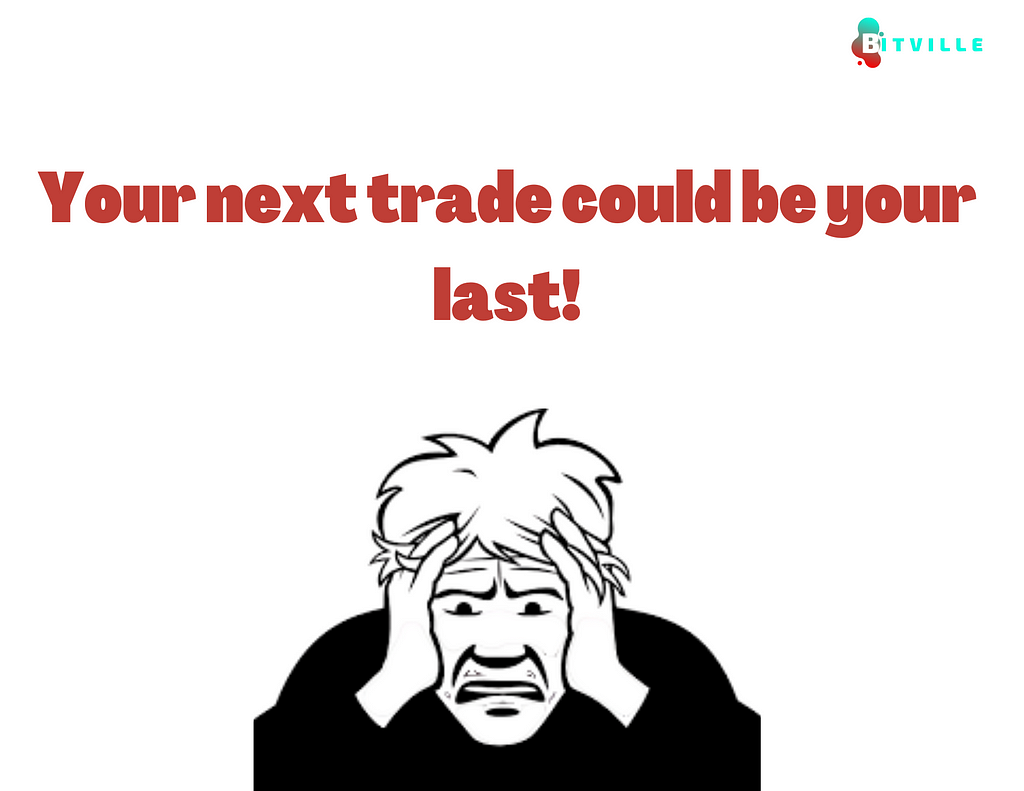“There are old traders and there are bold traders, but there are no old, bold traders.”
Check out our new platform: https://thecapital.io/
It’s easy to lose money trading. And yes, it’s possible to wipe out your entire account in a single trade! — especially if you’re trading with leverage.
A lot of traders (not just new ones) underestimate the importance attached to risk management. However, this is something that must be given utmost priority.
I’ve personally learnt the hard way. But if you are a constant reader of my newsletter, you must have come across a lot of content that will help shorten your learning curve as quickly as possible.
There’s this saying: “There are old traders and there are bold traders, but there are no old, bold traders.”
I’ve found it to be true, you know. It’s easy to see a new trader FOMO into an already pumped token and even come out unscathed with gains (giving them the superhero feeling). They chase the newest shiny DeFI token for 100%+ gains in the shortest possible time, without adequately considering the risks. Few times they come out safe, prompting them to go for more.
In the end, they tend to burn it all in one trade — just one bad trade! Then reality dawns on them.
If you want to last long in trading, you must learn to play defense and prioritize your risk management; otherwise, you will become toast.

So what is risk management?
Simply put, it is a series of actions you take to protect your trading account from huge losses.
Losses are a ‘given’ in trading! Because if you don’t win a trade, you’re surely going to lose some money — even if you’re using a stop-loss (but that’s what it’s for). As a trader, you should be making sure you lose as little as possible when you’re not winning because bigger losses can mess with your emotions, ultimately causing you to make reckless decisions like revenge trading, which can cause even more losses.
Admittedly, even the best of traders fall for this sometimes.
Now let’s look at a few things you can do to manage your risk while trading:
Don’t expect too much from the market
I’ve seen a couple of people come into my community with so much buzz. The market does what it does! One of my first responsibilities is to help them come to terms with reality. Trading takes a lot of effort and experience. If you come in when the market is having a bad time, you can get roasted from the word “go”. Try to learn as much as you can before getting exposed.
Have a job? Stick to it
When the crypto bulls appeared in 2017, a lot of people who got really lucky quit their jobs on the thought that they’ve found the holy grail. For some who didn’t know what to do with their gains, it turned out a bad decision. The truth is, you need a job (or other business) to take care of your basic needs even if you want to build a career in trading. Full-time trading would require that you have lots of backup funds. Why? You’re going mistakes and you don’t want your rent/meal to rely on your next trade. You also need a source to increase your trading capital. After all, the bigger the capital, you bigger the gains (and the more you’re comfortable taking a break from the market).
Pick a few out of many strategies
As a beginner, you have to try out different strategies to see what you prefer. If your coach is already using one that works, see if that works for you too. Specialize in it and wait for such setups to appear. Switching through different setups would make you unstable, and you won’t have time to back-test it enough to see if it truly works.
If you prefer to go ‘long’, wait for long setups to appear. Same for ‘short’ positions. There are people who just don’t like to short (for ethical reasons). Some kill it with shorting though. Focus on whatever setup you have mastered/ want to master.
Put a structure around your trades
This is a job. So you have to treat it as one. Don’t just wake up and jump onto trades. Create a watchlist, analyze on different timeframes, look out for strong fundamentals. And most importantly, ensure that you’re in the right mental frame before picking trades. Never pick trades out of desperation.
Avoid setting financial targets
‘I want to make $100, $1000, $5000 this week/month.” Projections like this are bad for trading and can creep in when you’re having a good time in the market. Again — the market does what it does and can take you by surprise.
Accept that there will be times when the market is slow and gives you nothing. You shouldn’t get frustrated — it’s simply time to back off. Never force trades because even perfect setups can go wrong. Trying to meet up with a financial target means you may have to force trades that are not clear.
Stop losses are non-negotiable
Always set your stop-loss right after entering a trade — even if you don’t want to set profit targets. That way you’re sure of what you will lose even if the trade goes wrong while you’re away. Also, understand that each trade has a different setup, so it’s better not to set stop-losses using percentage points, rather based on when the trading set-up is invalidated.
While these aren’t all that there is to look out for, these highlights are solid enough to catapult your trading game.
Learnt something? Kindly leave a clap and use the share button to let someone know!
https://twitter.com/thecapital_io
Pay attention! Or your next trade could be your last! was originally published in The Capital on Medium, where people are continuing the conversation by highlighting and responding to this story.
from The Capital - Medium https://ift.tt/3lIzBFp
0 Comments